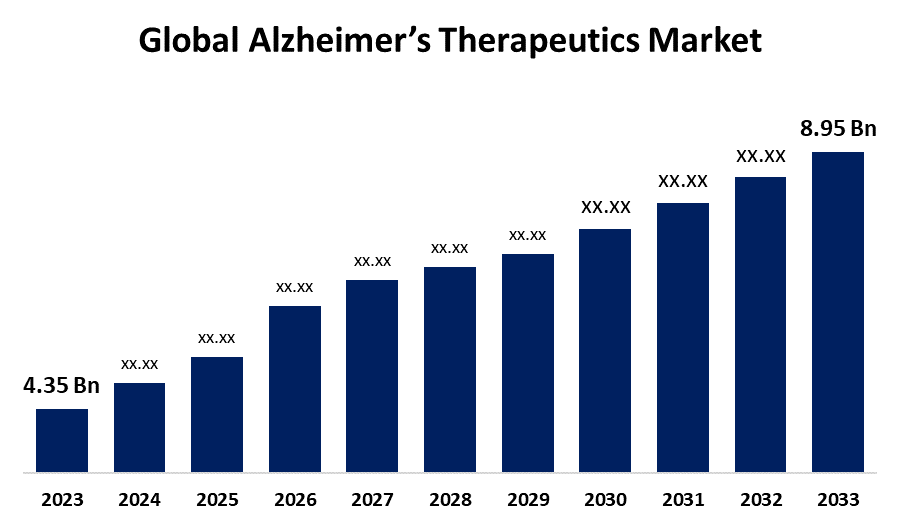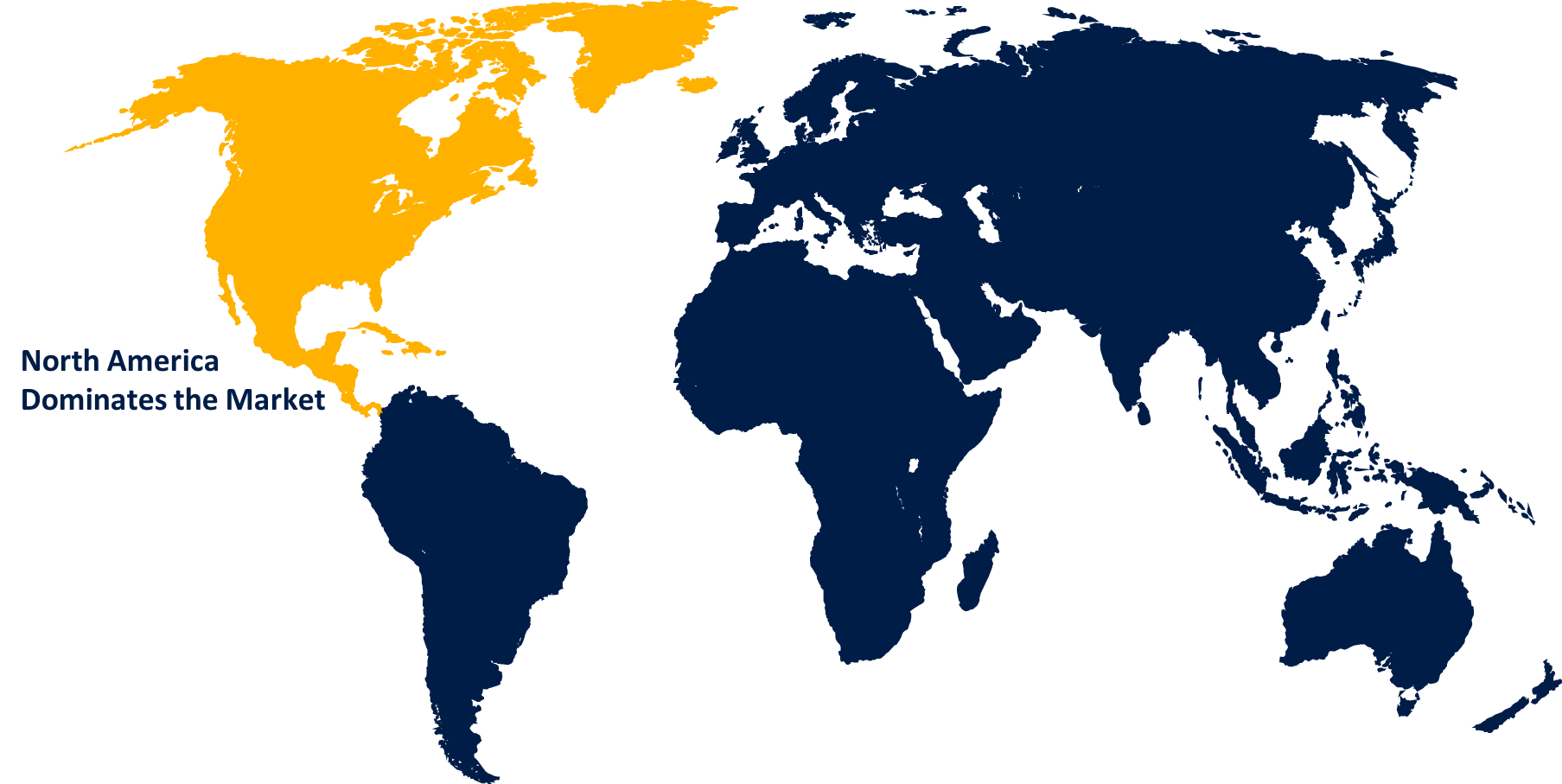Global Alzheimer’s Therapeutics Market Size, Share, and COVID-19 Impact Analysis, By Treatment (Cholinesterase Inhibitors, Pipeline Drugs, Combination Drugs, NMDA Receptor Antagonists), By End-User (Hospital Pharmacy, E-Commerce, Retail Pharmacy), and By Region (North America, Europe, Asia-Pacific, Latin America, Middle East, and Africa), Analysis and Forecast 2023 - 2033
Industry: HealthcareGlobal Alzheimer’s Therapeutics Market Insights Forecasts to 2033
- The Global Alzheimer’s Therapeutics Market Size was Valued at USD 4.35 Billion in 2023
- The Market Size is Growing at a CAGR of 7.48% from 2023 to 2033
- The Worldwide Alzheimer’s Therapeutics Market Size is Expected to Reach USD 8.95 Billion by 2033
- Asia Pacific is Expected to Grow the fastest during the forecast period.

Get more details on this report -
The Global Alzheimer’s Therapeutics Market Size is Anticipated to Exceed USD 8.95 Billion by 2033, Growing at a CAGR of 7.48% from 2023 to 2033.
Market Overview
Alzheimer's disease is a progressive brain disorder that gradually destroys memory, thinking skills, and basic tasks. While the brain shrinks in healthy aging with this illness, many neurons cease working, lose connections, and finally die. Symptoms typically appear in the mid-60s and are the most common cause of dementia among older adults. Dementia is the loss of cognitive functioning and behavioral abilities, affecting daily life and activities. Dementia disrupts processes vital to neurons and their networks, including communication, metabolism, and repair. The severity of dementia ranges from mild to severe, requiring complete reliance on others for daily activities. Named after Dr. Alois Alzheimer's, the cause likely includes genetic, environmental, and lifestyle factors. As per the data provided by the National Institute of Medicine, Alzheimer's dementia affects 6.7 million Americans aged 65 and older, and the figure is anticipated to climb to 13.8 million by 2060 unless medical breakthroughs are made. In 2019, there were 121,499 fatalities, making it the sixth greatest cause of death in the United States.
Report Coverage
This research report categorizes the market for the global Alzheimer’s therapeutics market based on various segments and regions forecasts revenue growth and analyzes trends in each submarket. The report analyses the key growth drivers, opportunities, and challenges influencing the global Alzheimer’s therapeutics market. Recent market developments and competitive strategies such as expansion, product launch, and development, partnership, merger, and acquisition have been included to draw the competitive landscape in the market. The report strategically identifies and profiles the key market players and analyses their core competencies in each sub-segment of the global Alzheimer’s therapeutics market.
Global Alzheimer’s Therapeutics Market Report Coverage
| Report Coverage | Details |
|---|---|
| Base Year: | 2023 |
| Market Size in 2023: | USD 4.35 Billion |
| Forecast Period: | 2023-2033 |
| Forecast Period CAGR 2023-2033 : | 7.48% |
| 2033 Value Projection: | USD 8.95 Billion |
| Historical Data for: | 2019-2022 |
| No. of Pages: | 243 |
| Tables, Charts & Figures: | 124 |
| Segments covered: | By Treatment, By End-User, By Region and COVID-19 Impact Analysis. |
| Companies covered:: | Biogen, Eli Lilly and Company, Roche, Pfizer, Novartis, Johnson & Johnson, Merck & Co., AstraZeneca, Bristol Myers Squibb, Eisai Co., Ltd., Amgen, AbbVie, Lundbeck, GlaxoSmithKline (GSK), Takeda Pharmaceutical Company, and other key vendors. |
| Pitfalls & Challenges: | COVID-19 Empact, Challenge, Future, Growth, & Analysis |
Get more details on this report -
Driving Factors
Alzheimer's treatment aims to manage and potentially reverse the progression of neurodegeneration by targeting specific pathways, such as amyloid beta plaques and tau protein tangles. These treatments can slow cognitive decline, improvement in mental function, and patient’s quality of life. Some therapies also address behavioral and psychological symptoms such as aggression, depression, and anxiety. Advances in disease-modifying therapies can delay critical stages reducing the burden on caregivers and the healthcare system leading to better long-term outcomes.
Restraining Factors
Current treatments for Alzheimer’s disease are ineffective, focusing on symptoms rather than reversing disease progression. Patients may experience only modest improvements in cognitive function, which tend to decline over time. Adverse side effects, high costs, and high failure rates of clinical trials hinder progress. Significant continuity in research and innovation is critical to achieving effective and accessible treatments for Alzheimer's disease, underscoring the need for effective and accessible treatments.
Market Segmentation
The global Alzheimer’s therapeutics market share is classified into product and end-user.
- The pipeline drugs segment is expected to hold the largest share of the global Alzheimer’s therapeutics market during the forecast period.
Based on the treatment, the global Alzheimer’s therapeutics market is divided into cholinesterase inhibitors, pipeline drugs, combination drugs, and NMDA receptor antagonists. Among these, the pipeline drugs segment is expected to hold the largest share of the global Alzheimer’s therapeutics market during the forecast period. The growth of Alzheimer’s disease is driven by the ongoing research and the development of new therapies, with pipeline drugs being the latest innovation. As the global burden of Alzheimer’s disease increases the demand for effective treatments that slow the disease progression or prevent disease rises drastically. Also, the expansion is being propelled by improvements in pipeline drugs and collaboration between pharmaceutical manufacturing and research institutes.
- The e-commerce segment is expected to grow at the fastest CAGR in the global Alzheimer’s therapeutics market during the forecast period.
Based on the end-user, the global Alzheimer’s therapeutics market is divided into hospital pharmacy, e-commerce, and retail pharmacy. Among these, the e-commerce segment is expected to grow at the fastest CAGR in the global Alzheimer’s therapeutics market during the forecast period. The rise of online platforms for purchasing medications, including Alzheimer's treatments, is largely driven by the convenience of ordering drugs online and the widespread availability of e-commerce services. The COVID-19 pandemic has further accelerated this shift, as people prefer home delivery over in-person shopping. This trend is expected to continue, supporting the growth of the e-commerce segment in the Alzheimer's therapeutics market.
Regional Segment Analysis of the Global Alzheimer’s Therapeutics Market
- North America (U.S., Canada, Mexico)
- Europe (Germany, France, U.K., Italy, Spain, Rest of Europe)
- Asia-Pacific (China, Japan, India, Rest of APAC)
- South America (Brazil and the Rest of South America)
- The Middle East and Africa (UAE, South Africa, Rest of MEA)
North America is anticipated to hold the largest share of the global Alzheimer’s therapeutics market over the predicted timeframe.

Get more details on this report -
North America is anticipated to hold the largest share of the global Alzheimer’s therapeutics market over the predicted timeframe. The region’s dominance in the global Alzheimer's therapeutics market is attributed to factors such as high Alzheimer's prevalence, significant healthcare spending, and advanced medical infrastructure. The U.S. pharmaceutical industry, government support, and widespread adoption of advanced diagnostic tools and therapies further solidify its position in the market. Also, the region's high awareness among the population and healthcare providers further solidifies its position in the global market.
Asia Pacific is expected to grow at the fastest pace in the global Alzheimer’s therapeutics market during the forecast period. The region is experiencing rapid growth in Alzheimer's therapeutics due to factors such as an aging population, increasing healthcare expenditure, and increased awareness of neurodegenerative diseases. Investment in pharmaceutical research and development is also increasing, with the region becoming the fastest-growing segment globally. This growth is fueled by economic growth, improved healthcare infrastructure, and advanced therapeutics.
Competitive Analysis:
The report offers the appropriate analysis of the key organizations/companies involved within the global Alzheimer’s therapeutics market along with a comparative evaluation primarily based on their product offering, business overviews, geographic presence, enterprise strategies, segment market share, and SWOT analysis. The report also provides an elaborative analysis focusing on the current news and developments of the companies, which includes product development, innovations, joint ventures, partnerships, mergers & acquisitions, strategic alliances, and others. This allows for the evaluation of the overall competition within the market.
List of Key Companies
- Biogen
- Eli Lilly and Company
- Roche
- Pfizer
- Novartis
- Johnson & Johnson
- Merck & Co.
- AstraZeneca
- Bristol Myers Squibb
- Eisai Co., Ltd.
- Amgen
- AbbVie
- Lundbeck
- GlaxoSmithKline (GSK)
- Takeda Pharmaceutical Company
- Others
Key Target Audience
- Market Players
- Investors
- End-users
- Government Authorities
- Consulting And Research Firm
- Venture capitalists
- Value-Added Resellers (VARs)
Recent Developments
- In July 2024, The FDA approved Kisunla™, Eli Lilly and Company's Alzheimer's treatment for adults with early symptomatic Alzheimer's disease.
- In July 2024, Alpha Cognition, a biopharmaceutical company, received FDA approval for ZUNVEYL®, a benzgalantamine, for treating mild-to-moderate Alzheimer's disease.
Market Segment
This study forecasts revenue at global, regional, and country levels from 2020 to 2033. Spherical Insights has segmented the global Alzheimer’s Therapeutics market based on the below-mentioned segments:
Global Alzheimer’s Therapeutics Market, By Treatment
- Cholinesterase Inhibitors
- Pipeline Drugs
- Combination Drugs
- NMDA Receptor Antagonists
Global Alzheimer’s Therapeutics Market, By End-User
- Hospital Pharmacy
- E-Commerce
- Retail Pharmacy
Global Alzheimer’s Therapeutics Market, Regional
- North America
- US
- Canada
- Mexico
- Europe
- Germany
- Uk
- France
- Italy
- Spain
- Russia
- Rest of Europe
- Asia Pacific
- China
- Japan
- India
- South Korea
- Australia
- Rest of Asia Pacific
- South America
- Brazil
- Argentina
- Rest of South America
- Middle East & Africa
- UAE
- Saudi Arabia
- Qatar
- South Africa
- Rest of the Middle East & Africa
Frequently Asked Questions (FAQ)
-
1. Which are the key companies that are currently operating within the market?Biogen, Eli Lilly and Company, Roche, Pfizer, Novartis, Johnson & Johnson, Merck & Co., AstraZeneca, Bristol Myers Squibb, Eisai Co., Ltd., Amgen, AbbVie, Lundbeck, GlaxoSmithKline (GSK), Takeda Pharmaceutical Company, and Others.
-
2. What is the size of the global Alzheimer’s therapeutics market?The Global Alzheimer’s Therapeutics Market is expected to Grow from USD 4.35 Billion in 2023 to USD 8.95 Billion by 2033, at a CAGR of 7.48% during the forecast period 2023-2033.
-
3. Which region is holding the largest share of the market?North America is anticipated to hold the largest share of the global Alzheimer’s therapeutics market over the predicted timeframe.
Need help to buy this report?